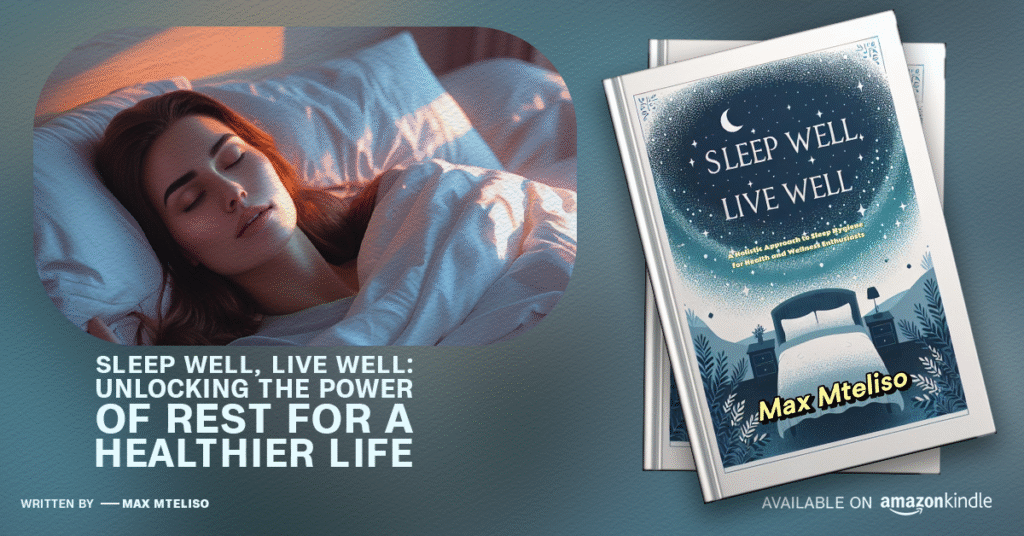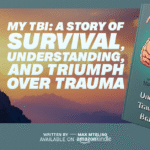In the race of modern life—where deadlines, screens, and responsibilities never seem to end—sleep often becomes the first casualty. Many of us compromise rest to make room for work, social commitments, or late-night distractions, only to wake up drained, unfocused, and anxious. Yet science consistently proves that sleep is not a luxury—it is a necessity. In Sleep Well, Live Well: A Holistic Approach to Sleep Hygiene for Health and Wellness Enthusiasts, author Max Mteliso provides a practical, science-backed, and deeply holistic guide to reclaiming rest and, in turn, transforming health.
Mteliso begins by grounding his book in the science of sleep. He explains in simple, accessible terms how the body cycles through different stages of rest, and why each stage matters for mental clarity, physical health, and emotional stability. Far from being a passive state, sleep is when the brain processes memory, hormones are regulated, and cells are repair. By highlighting the devastating impact of chronic sleep deprivation—from weakened immunity to increased risk of heart disease—Mteliso makes an urgent case for why better sleep hygiene is essential in today’s overstimulated world.
But Sleep Well, Live Well goes beyond science to explore how practical lifestyle changes can dramatically improve sleep quality. One of the standout features of the book is its focus on the environment. Mteliso details how a carefully curated bedroom can set the stage for rest. From reducing blue-light exposure to optimizing room temperature and investing in supportive bedding, he shows how small, thoughtful changes in surroundings create a sleep sanctuary. For wellness enthusiasts who already invest in fitness and nutrition, this environmental emphasis is a game-changer—reminding readers that the bedroom is as important as the gym or kitchen when it comes to health.
Equally compelling is his focus on routines. Mteliso advocates for intentional pre-sleep rituals that help the body and mind transition from high activity to rest. He suggests mindfulness practices, gentle stretches, and calming techniques such as journaling or reading. By establishing consistency, he explains, we train our internal clock to signal when it’s time to rest, making quality sleep a natural habit rather than an occasional gift.
Where the book truly shines, however, is in its embrace of holistic approaches. Mteliso explores the benefits of aromatherapy, herbal remedies, and mindfulness not as quick fixes, but as tools for long-term well-being. He explains how lavender oil, chamomile tea, or guided meditation can become part of a comprehensive sleep strategy, adding dimension to traditional advice. These methods align perfectly with the needs of health and wellness enthusiasts who are increasingly seeking natural, integrative ways to optimize performance and longevity.
Stress and anxiety management also take center stage in the book. Recognizing that restless nights often stem from racing thoughts or unresolved tension, Mteliso provides strategies for calming the nervous system. Breathing exercises, gratitude practices, and cognitive reframing are introduced as practical ways to quiet the mind before bed. He makes clear that good sleep is not just about shutting the eyes, but about creating the inner conditions for peace.
Nutrition and exercise, often overlooked in discussions about sleep, receive careful attention here as well. Mteliso explains how late-night caffeine, alcohol, or heavy meals can sabotage rest, while certain foods can promote deeper sleep. Similarly, he emphasizes the role of regular physical activity in regulating circadian rhythms, while cautioning against intense workouts too close to bedtime. These insights ensure that readers view sleep not in isolation but as part of a holistic lifestyle.
Importantly, Mteliso also addresses the need to seek professional help when necessary. Sleep disorders such as apnea or chronic insomnia require medical support, and the book encourages readers to view professional care as a proactive step rather than a last resort. By blending personal empowerment with medical wisdom, the book empowers readers to take sleep seriously while recognizing the value of expert guidance.
What makes Sleep Well, Live Well especially valuable is its broad applicability. Whether you are a parent juggling family responsibilities, a professional burning the candle at both ends, or a wellness enthusiast seeking optimization, the book offers actionable advice that can be tailored to any lifestyle. It is not a one-size-fits-all prescription but a versatile toolkit for creating healthier nights.
Ultimately, Mteliso reframes sleep not as wasted time, but as one of the most powerful investments in health. He reminds readers that productivity, creativity, and resilience all begin with rest. The book is as much a manifesto for reclaiming balance as it is a guide for better sleep.
In a culture that glorifies busyness, Sleep Well, Live Well stands as a bold reminder: slowing down to rest is not weakness but wisdom. With its combination of science, holistic strategies, and practical tools, Max Mteliso’s book provides the blueprint for turning restless nights into rejuvenating experiences. By embracing its insights, readers can expect not only to sleep better but to live better—energized, focused, and aligned with the fullness of wellness.
Amazon Link: Sleep Well, Live Well



